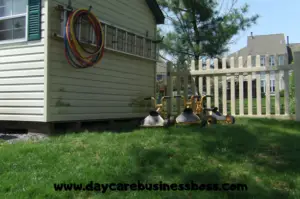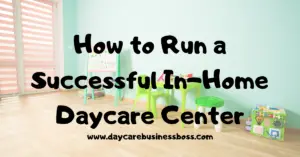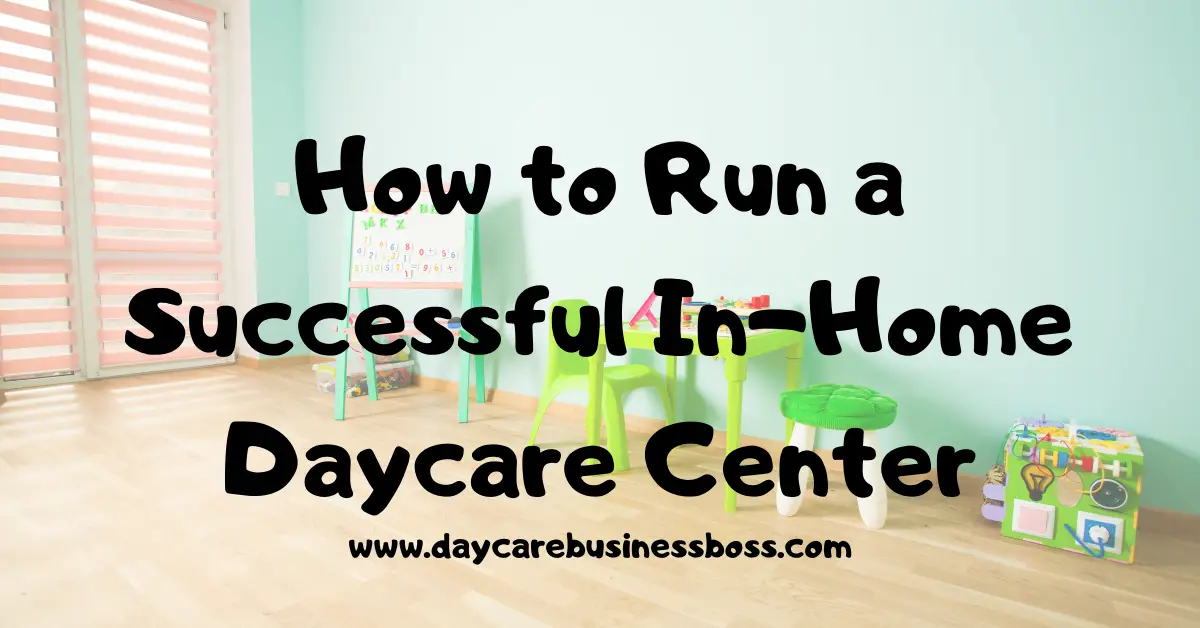Do you love children and would love the opportunity to work from home? If so, running an in-home daycare may be the perfect business opportunity for you. You can turn your home into a source of revenue for you and your family without much startup costs. However, you may still find this venture a bit challenging, as even the most well-behaved children can still prove to be challenging from time to time.
If you want your in-home daycare center to be a success, while still keeping your sanity, follow these nine tips:
-
Write a business plan.
-
Develop Your Program.
-
Make the children are your friends, not the parents.
-
Establish rules, and stick to them.
-
Tuition must be paid in advance.
-
Do not enroll your friends’ or your family’s children.
-
Keep business hours and family time separate.
-
Get insurance for your business.
-
Listen to your instincts.
Write a Business Plan
The first step to opening any business is to write a business plan. Business Know-How suggests writing a business plan, even if you only plan to care for a few children. Besides, if you don’t know what your operating costs are, how are you going to know how much to charge?
While the children you care for may be out of control, your business will be under control thanks to a well-thought-out business plan.
Develop Your Program
Now that you have taken the time to carefully write your business plan, Paper Pinecone says it’s time to develop your program. The program you decide to implement should be based on your community’s needs. For example, if you notice that the community where you reside has its fair share of daycare centers, try to specialize in infant care. After-school care is always in high demand as well.
Developing your program also consists of choosing a curriculum, which will be based on the kind of care you provide. Parents want their children to be educated, and they don’t want to enroll their child in one of “those daycares” that let children run wild like a pack of wild animals. Trust me when I say that this will do absolutely nothing for your sanity.
The Children Are Your Friends, Not the Parents
Well, we all know people who will tell you every last bit of their business. Do you want to have to deal with that from the parents of your children? Let me paint a picture for you. The last parent is at your daycare for evening pick-up. It’s almost six in the evening and you still have to feed your family. Do you want to listen to this parent go on and on about people you have never met until almost eight o’clock? Of course, you don’t.
An in-home daycare is a much more informal setting than an actual daycare center. For this reason, parents are much more comfortable approaching you, Per Hopping In. This can lead to some confusion regarding personal boundaries. Keep in mind that the children are your friends. You should be friendly with your parents.
Establish Rules and Stick To Them
We all know that children don’t necessarily follow rules very well. Sometimes, neither do their parents. You must establish rules for your students and your parents and strictly adhere to both of them. What if the parents of the children refuse to follow the rules? Simply put, stay steadfast and consistent with your rules. According to Research Gate, “Repetition is the recipe of all learning.”
Clear policies and rules that are routinely enforced benefit more than the children you care for. They also help to establish clear boundaries with parents. Without clear policies and rules, this can result in parents either dropping their children off too early or picking them up too late, per Business Know-How.
Tuition In Advance
There aren’t many people I know who are willing to work for free. Are you? No, I didn’t think so. Parents Magazine states that the average tuition for in-home daycare is $199 per week. It may not seem like much, but this can add up. This especially holds when three to six parents are perpetually behind on their payment. Invoice Berry Blog states that one of the most frightening aspects of owning your own business is that your payment is not guaranteed. This is why tuition for your daycare must be paid in advance. 
Of course, you are going to have parents who drop their children off at you in the morning, forgetting to pay tuition because they are late for work. And what about that one parent that always forgets their checkbook? Two great remedies for these conundrums are to offer online payments and automatic withdrawal. This way, your payments are coming in regularly, and parents have one less thing to worry about.
No Friends or Family Members
When your business is in its infancy (pun intended), you may be tempted to watch the children of your friends and family. After all, you need to get your business off the ground, and they would all give you glowing recommendations. That might not be the best idea. The Business Journals list confidentiality as one of the major risks you take when doing business with friends.
There is no doubt going to be some crossover regarding people with whom you and the parents of your children associate. As a business owner, the last thing you want to do is get caught in the crossfire of mindless gossip or have to choose sides where a friend or family member is concerned. This can cause resentment, and make for some fairly awkward holidays and social gatherings. Nobody wants that.
Keep Business Hours and Family Time Separate
After caring for children who don’t belong to you all day, make sure to set some time aside for yourself. It may be a bit more difficult to strike a good work-life balance when you run your business from home. However, it is necessary. Forbes says that maintaining a healthy work-life balance reduces stress and prevents burnout.
 You are already watching some of your children more than eight hours a day, five days a week. Do yourself (and your family) a favor. Establish a clear and firm distinction between business hours and personal hours. If you don’t, you will probably be bombarded with more early drop-offs and pick-ups than you can handle.
You are already watching some of your children more than eight hours a day, five days a week. Do yourself (and your family) a favor. Establish a clear and firm distinction between business hours and personal hours. If you don’t, you will probably be bombarded with more early drop-offs and pick-ups than you can handle.
Get Insurance
Imagine this, if you will. You turn your head for one second to tend to a screaming child and another one is headed straight for an electrical outlet. Even worse, your dog nips an overly playful child. As small as the incident may have been, the parent still insists on taking their child to the hospital. What do you do?
Most businesses are insured. Your daycare should be no different. Your homeowner’s insurance probably won’t cover childcare-related claims such as accidents, liabilities, or damages about your daycare business, per Business Know-How. Most states require in-home daycares to carry liability insurance, according to American Family Insurance.
Learn more about insuring your business HERE.
Listen To Your Instincts
There is an old saying that simply says, “trust your gut.” We have all had that feeling deep down in our stomach warning us that something isn’t right. That’s your gut, and you should listen to it more often than you do.
When interviewing prospective customers, it is of the utmost importance to listen to your instincts. If something “doesn’t feel right,” trust your instincts. You may cost yourself a potential customer upfront, but you might save yourself a lot of trouble in the long run.
Nobody said that running an in-home daycare was easy. Children are hungry, they are crying, and they are doing their absolute best to imitate professional wrestlers by diving off of your furniture. Hopefully, armed with some of the insight you have been given, you can take charge of that daycare and run it like a pro (while you still have some of your sanity left).
Related Questions?
Do I need to be licensed to run a home daycare?
Per Dalton Dooly, there are three types of home daycare situations. These are licensed home daycares, unlicensed home daycares, and group home daycares. Not every state requires you to be licensed for home daycare. To see if your state requires you to be licensed, check here. Though running a home daycare may not require any specific licenses, there are still certain rules to which you must adhere. These rules pertain to, such as the number of children you are allowed to care for.
Are there any other requirements to run a home daycare?
Again, the answer to this question varies from state to state. The Houston Chronicle says that in most states, the individual starting the daycare must be at least 18 years of age, must be free of felonies, and must take a health exam to prove that they don’t have any diseases which will put children at risk. A complete list of child care licensing and regulations can be found here.

Please note: This blog post is for educational purposes only and does not constitute legal advice. Please consult a legal expert to address your specific needs.
To learn more on how to start your own daycare checkout my startup course and documents here.

Meet Shawn Chun: Entrepreneur and Childcare Business Fan.
I’m a happy individual who happens to be an entrepreneur. I have owned several types of businesses in my life from a coffee shop to an import and export business to an online review business plus a few more and now I create online daycare business resources for those interested in starting new ventures. It’s demanding work but I love it. I do it for those passionate about their business and their goals. That’s why when I meet a childcare business owner, I see myself. I know how hard the struggle is to retain clients, find good employees and keep the business growing all while trying to stay competitive.
That’s why I created Daycare Business Boss: I want to help childcare business owners like you build a thriving business that brings you endless joy and supports your ideal lifestyle.


